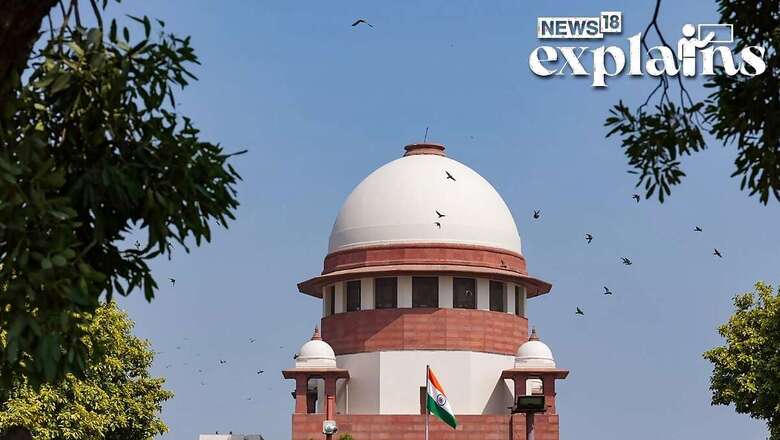
views
A day after allowing a woman to terminate her 25-week-old pregnancy, the Supreme Court on Thursday asked All India Institute of Medical Sciences (AIIMS) authorities to put it on hold. The apex court also gave her 24 hours to reconsider her decision.
A bench of Justices BV Nagarathna and Hima Kohli on Monday allowed the woman to undergo abortion after she said she was suffering from ‘lactational amenorrhea’ and depression due to which she is “unwilling to continue with the pregnancy”.
However, another bench presided by Chief Justice DY Chandrachud said that AIIMS doctors were in a dilemma as they were of the view that the foetus is “currently viable” meaning it will show signs of life and has a strong chance of survival. The court on Friday called for a fresh report from AIIMS on whether the foetus is suffering from any substantial abnormality,
Termination of pregnancies in the country is governed by the Medical Termination of Pregnancy Act 1971 (MTP Act), which has been amended in 2021 to make it more inclusive.
The Landmark Case
A Division Bench of the Delhi High Court on July 15, 2022, denied permission to a 25-year-old woman from Manipur who had sought permission to terminate her ongoing pregnancy through registered medical practitioners.
According to the petitioner, she was carrying a single intrauterine pregnancy corresponding to a gestational age of twenty-two weeks. She became pregnant as a result of a consensual relationship but wished to terminate her pregnancy as her partner had refused to marry her.
In her petition, she stated that she did not want to carry the pregnancy to term since she was wary of the “social stigma and harassment” pertaining to unmarried single parents, especially women. Moreover, the appellant submitted that in the absence of a source of livelihood, she was not mentally prepared to “raise and nurture the child as an unmarried mother”.
The petitioner sought permission to terminate her pregnancy in terms of Section 3(2)(b) of the Medical Termination of Pregnancy Act 19712 and Rule 3B(c) of the Medical Termination of Pregnancy Rules (as amended on 12 October 2021).
The Delhi High Court rejected her plea while observing that Section 3(2)(b) of the MTP Act was inapplicable to the facts of the present case since the appellant, being an unmarried woman, whose pregnancy arose out of a consensual relationship, was not covered by any of the sub-clauses of Rule 3B of the MTP Rules. Under Section 3(2)(b) of the Medical Termination of Pregnancy Act, 1971, termination of pregnancy is allowed till the 20th week and not more than that.
What the Supreme Court Ruled
The petitioner then appealed before the Supreme Court. Initially, as an interim measure, the apex court modified the order of the High Court and permitted the appellant to terminate her pregnancy.
In the final judgement delivered on 29 September 2022, the Supreme Court led by Justice DY Chandrachud ruled that all women, irrespective of their marital status, are entitled to a safe and legal abortion up to 24 weeks of their pregnancy as the MTP Act recognizes the reproductive autonomy of every pregnant woman to choose medical intervention to terminate her pregnancy.
“The rights of reproductive autonomy, dignity and privacy under Article 21 give an unmarried woman the right of choice on whether or not to bear a child, on a similar footing of a married woman,” the judgment said.
It is important to note that the Supreme Court in its interim order dated 21 July 2022 noted that as per the MTP (Amendment) Act 2021, “the phrase ‘married woman’ was replaced by ‘any woman’ and the word ‘husband’ was replaced by ‘partner’.
The apex court in its order stated, “phrase ‘married woman’ was replaced by ‘any woman’ and the word ‘husband’ was replaced by ‘partner’. But evidently, there is a gap in the law: while Section 3 travels beyond conventional relationships based on marriage”.
The judgment further stated. “Rule 3B of the MTP Rules does not envisage a situation involving unmarried women, but recognizes other categories of women such as divorcees, widows, minors, disabled and mentally ill women and survivors of sexual assault or rape. There is no basis to deny unmarried women the right to medically terminate the pregnancy, when the same choice is available to other categories of women”.
Medical Termination of Pregnancy Act
The preamble of the MTP Act states that it is an “act to provide for the termination of certain pregnancies by registered medical practitioners.”
The Medical Termination of Pregnancy Act, 1971 (MTP Act) which was amended in 2021 governs the circumstances under which abortions are legally permitted in India.
The 2021 amendment extended the gestational limit from 20 to 24 weeks for “certain categories of women”. These are listed under Rule 3B of the MTP Rules.
The categories include:
- Survivors of sexual assault or rape or incest
- Minors
- Change of marital status during the ongoing pregnancy (widowhood and divorce)
- Women with physical disabilities [major disability as per criteria laid down under the Rights of Persons with Disabilities Act, 2016 (49 of 2016)].
- Mentally ill women including mental retardation.
- The foetal malformation that has a substantial risk of being incompatible with life or if the child is born it may suffer from such physical or mental abnormalities to be seriously handicapped.
- Women with pregnancy in humanitarian settings or disaster or emergency situations as may be declared by the Government.
The Act provided for termination of pregnancy if it does not exceed twenty weeks and for a certain “category of women” if pregnancy exceeds twenty weeks but does not exceed twenty-four weeks.
However, the Supreme Court judgment made the “up to 24 weeks” clause applicable to all women.
The Act also directs that every State government or Union territory must constitute a Medical Board for the purpose of examining if the case is fit to be granted relief under the MTP Act. The Medical Board shall consist of (a) a Gynaecologist (b) a Paediatrician; (c) a Radiologist or Sonologist; and (d) such other number of members as may be notified in the Official Gazette by the State Government or Union territory, as the case may be.
The Act also by rule makes it mandatory that the medical practitioner who assists the termination of the pregnancy shall not reveal the name and other particulars of the woman whose pregnancy has been terminated.



















Comments
0 comment